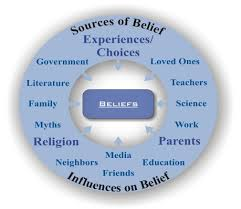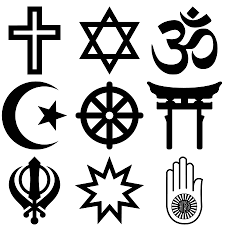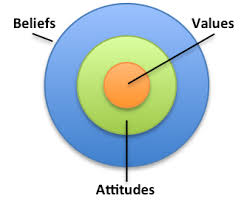1. Introducing the Course
Much has been written about a Christian (or Biblical) world view. The course does not seek to duplicate the substantial corpus of helpful material about world views that is ready available in the public square, although treatment of the issues will throw up common matters of interest and some existing approaches will be reflected in parts. It does, however, seek to surface and link varied approaches in a simple but consolidated way for newcomers, in an Australian context.
The writer has lived in Catholic, Protestant, secular, Muslim and East Asian cultures, in Australia, the Pacific, the Americas, Asia, Africa and Europe, as a Christian pastor, tent-maker, diplomat and civil servant, and has drawn on this background in developing the course.
Lesson Objectives
In this introductory lesson we will discuss:
- What do we mean by "world view"?
- What are the sources of people's world views?
- Understanding the Spirit of the Age
- Defining "truth"
- Understanding "glasses" we are already wearing
- Why consider different world views?
- Why study this course?

Setting the Scene
You are not an island. You are not neutral. When you look around you, your mind interprets what you see, using hard wiring and coding laid down over a long period. When you open your mouth your world view speaks. When you make a decision, you do so on the basis of your world view priorities. When you process what you see and hear every day, you do so through the filters and architecture of that world view. Your ideology, though patterns, values and assumptions are strongly informed by that world view. What you have devoured you have become. Your beliefs have assumptions embedded in them. What you believe has shaped you.
Our model, as Christians, is Jesus Christ. He lived in another age, another culture, which were in many ways alien to our own.
His world view was informed by his culture, its belief structures, its nuanced history and its relationship
with other nations and cultures. However, it was instructed by His relationship with Father God.
Jesus was God but He was man; he was man but He was God. He intersected every day with a world community impacted by sin. He was tempted by community values and pressured by social expectations. But He did not become like His world. He is our example. But more than an example; His life is our life. As Christians our minds are to be like His.
The Pharisees of Jesus' day were so careful to avoid breaking God's commandments that they built a fence around them; they added 248 commandments and 365 prohibitions to ensure they did not even approach the original ten. However, a Christian world view is not a prescribed framework or a set of standards or codes. Nor is it a "Christian culture". It is a transformed life, re-made in the image of Christ, able to reflect him in any circumstance or culture. As a Christian your mind is to be like that of Christ.
This course will offer a lot of information, but information alone is not transformative; only the Holy Spirit can produce inner change.
Two of the big issues in the Garden of Eden (as recounted in Genesis 3) were the Tree of Life and the Tree of the Knowledge of Good and Evil. While Adam and Eve came to "know" more, they cut themselves off from life when they disobeyed God. Knowledge in and of itself proved to be inadequate. We are to love God with hearts and our minds.
Let us approach this subject with a view to learning what we can, and putting it into context, but asking the Holy Spirit for a radical inner change so that that way we think can become that of Jesus Christ. The Christian life is not just learning or even having (or "leaning on") human understanding. It is about relationship, with Jesus Christ, the Word who became flesh, developing intimacy with God, seeing the world through His eyes.
What is a world view?

"Get a new world view each week" (The Economist, Asia, advertisement on Facebook January 2015)
Everyone person has a world view, or kaleidoscope of views > how should we believe and live? But what do we mean by "world view"?
By its simplest definition, it is a "view of world":
- a prism, a lens, through which we see the world around us
- a language, a discourse, a vocabulary, a discussion about "all of this" (seen and unseen)
- a perspective, mindset, what we believe to be reality- can be either objective or subjective, isolated
- an anchor, a landmark, a landscape (in a time or space), to hold onto in time of change
- a "story", that holds things together in ways we can understand (and verbalise)
- a customised way of interpreting events and circumstances, almost like a code breaker to see what lies behind clues that are given to us
- a way of explaining the world in language, not esoteric concepts
- a cultural mirror, an identity > that we may have adopted and reflect back to our world
- a set of beliefs, a filter for our convictions, a rationale we offer for believing what we do and are prepared to stand by, or be indifferent to, a gauge of what we consider to be important/valid
- a statement of values, or standards that help define our place in our tribe, and individualise us ("my" view) or create common ground ("our" view)
- a set of definitions; what comes to mind when we use language, eg when we say "justice", what springs to mind? - what is justice? whose justice? why is it important? why now? is it relevant? is it flexible? Is it enduring?
According to Charles Colson, a worldview is "the sum total of our beliefs about the world. It is the way we interpret everything. Colson says that "The inner life of faith must shape our actions out in the world" (Colson, C, Kingdoms in Conflict: An insider's challenging view of politics, power and the pulpit, Morrow/Zondervan, USA, 1987, p. 302). "Culture" is ... the way we, and those around us (our group, or society), think and live our lives. It is a set of agreed beliefs, ideals, values and behaviours that we share. Culture informs values, and vice versa.
Believers in God, atheists and agnostics have world views. Consider Richard Dawkins' near-deification of his scientific method, his rigid dogma against theism, his unshakeable refusal to acknowledge the reality (or worth) of the faith of millions, his conviction (faith) in his stand against belief. Don't be shocked. He is simply operating out of a developed world view.
Adherents of other religions (whether or not they believe in God) have world views: origins, the nature of humanity, our future state (or non-state). World views lead to great scientific developments and philanthropic ventures; they also lead to wars and terrorism.
All Christians have world views, either (one of a number of) Christian world views or reflective of their societies' prevailing world views. Just because a person is a Christian, or claims to be, their actions and lifestyle may actually not reflect a Christian world view. Moreover, not all Christians think alike.
We should not be surprised when people think and act the way they do. We should be surprised when they act differently to what they say they believe.
Sources of World Views
Epistemology is the study of the origin, nature, and limits of human knowledge.

What lies behind belief?
- prevailing culture (or sub-culture)
- family background and individuals
- friends
- religion
- school/university
- social clubs
- media
- leaders
- books
- heroes
- class, social structures
- workplace, bosses, colleagues
- individual assessments/conclusions
World views can (consciously or sub-consciously) be allied to social pressures, personal networks, political power, dominant cultures in a society, or economic drivers. They can be impacted by reductionism, determinism, or liberalism.
Christians believe that we only understand spiritual truth by revelation. Christian culture emerges from putting this into practice, together with like-minded believers - the group, or community, that we associate with - as a result of an inner transformation by the Holy Spirit.
Axiology is the way we give "value" to beliefs or things. Why do we accept some world views and not others? How do we evaluate them? Can we really be objective? Do we stop to consider what is going on and what is really important?
Ideas can be catalysts for good ... or harm. How do ideas develop? How is thinking shaped? Ideas do not generate in a vacuum. What weight should be placed on context? Language is important; but consider the following well-known quotes (not placed in their context):
"Let us eat and drink, for tomorrow we die." (1 Corinthians 15:32)
"We hold these truths to be self-evident, that all men are created equal, that they are endowed by their Creator with certain unalienable Rights, that among these are Life, Liberty and the pursuit of Happiness" (US Declaration of Independence)
"Man's chief end is to glorify God, and to enjoy him for ever." (Westminster Shorter Catechism)
"The trouble with (The Australian) is that it has a particular world view, which I would regard as a right-wing conservative world view." (Robert Manne, "Bad news: Rupert Murdoch's Australian", http://www.latrobe.edu.au/news/articles/2011/podcasts/bad-news-rupert-murdochs-australian/transcript, accessed 23 January 2015
What do these statements really mean? How do we know? Can we take them at face value? Can we trust them? Do they really mean what we think they say? Are there other messages?

The Spirit of the Age
"...walking according to the course of this world" (Ephesians 2:2)
Every age and society has its own thoughts, ideas, priorities and values that influence how people live. The age we inhabit is marked by opportunity, complexity, uncertainty and rapid change. We are learning more than ever, travelling further and faster than ever, living longer and closer to one another than ever, cultures are bouncing into one another on all sides, while notions of "truth" are challenged as never before. There is a "vibe" about living in our world, but political, social and economic gaps are still growing. What drivers lie beneath?

Social consensus. Seeks to convince us that value propositions that dominate our culture are:
- authentic
- authoritative
- universal
- complete
- sophisticated/intellectually superior
- popular
- appealing
- self-fulfilling
- self sufficient
- enlightening
- rational
- positive
- intellectual
- the dominant discourse
Anything that differs from consensus is a potential threat, because it does not conform, it is different. Sometimes called "fundamentalism", pejoratively. Some fundamentalisms seek to go back to the basics (eg "Salafism" argues that if Islam is to be "reformed" it needs to go back to the original precepts).
Fundamentalism can also involve social or theological reengineering and control. Fundamentalism (even Christian versions) can undermine the very faith it purports to protect, eg what is a Christian response to somebody who blows up an abortion clinic in the name of Christian values and a Christian society?
The Spirit of the Age can operate through any or all of the following:
- Theology, Sociology & Philosophy
- Law
- Ethics
- Media (print, TV, entertainment, social media)
- Politics, power, systems, government and public policy
- Education
- Marriage and family, gender issues
- Science
- Environment
- Economics
- Art and literature
- History
- Global forces in international relations
We will look at each of these in turn, along with a number of "clusters" of world views than are prominent today and compete for our head space.
What is truth? Whose truth is true?
"My mind is made up. Don't confuse me with fact."
"Everyone is free to believe what they like." But do they?
How do we know
what we believe,
why we believe, and the
consequences? Whose views ought to prevail? Not all Christians think alike. Not all Muslims or agnostics think alike.

There is a choice: the Bible says that if you love the world the love of the father is not in you (1 John 2:15). If you love Christian doctrine (eg holiness) for its own sake this does not automatically mean that love of the Father is in you either; your motivation may be pride or religious dogmatism, reflecting tribal disagreements between Christian communities; simply part of the circus of competing ideas.
The Christian view is that all men and women in the world without Christ are spiritually blinded (1 Corinthians2:14; 2 Corinthians 4:4); they search, but lack understanding. It is easy to use (or to unquestioningly echo) the language of the spirit of the age (1 Corinthians 2:12; Ephesians 2:2; 1 John 2:15-17).
Where do we draw the line? Is there a line? The boundary between Christian and non-Christian cultures is not black and white.
Whose glasses are you wearing?
Is your world view a Christian world view? How do you know? Could it be that you are living by a non-Christian world view?
The Christian world view stems from Christ, who taught the Kingdom of God, based on faith in, and submission, to, a person, Jesus Christ. Is that focus too simplistic?
Test your assumptions. What does a Christian world view look like in a society that:
- condones feudalism, slavery?
- imposes a state religion?
- is secular?
- promotes (godless) capitalism or (godless) socialism as ends in themselves?
- takes its inspiration from pre-Christian classical theory and histories?
- treats women as chattels?
- treats unborn or born infants, the aged or the sick as "disposable"?
- promotes the use of arms in "just wars"?
- sanctions the taking up of arms against other religions, denominations?
- eliminates indigenous populations?
- celebrates (and endorses) atheism?
- holds "religion" at arm's length
- supports, or sanctions, the rise of fascism?
- promotes individual ethnic groups over others
- promotes, or sanctions, civil disobedience?
- calls itself Christian but is secular (may be labelled "Christian" by other religions, eg through a Muslim lens)?

These are all real examples in which influential "Christian" leaders have supported the concepts listed. What motivates them?
God's view of the world explains the importance of the Incarnation. God understands us because He became one of us (consider Hebrews 2:14-18). "What would Jesus do" flows from this. However, it is hard to put a Christian world view into a neat package. Such a world view cannot be systematised. What might be the world views of Christians in the following scenarios?
- a Palestinian Anglican living in Jerusalem?
- a new believer working for an IT company in Sydney, London or Los Angeles?
- a Christian mother in a remote community in Guinea Bissau or the Kimberleys?
- a conservative family processing changing social attitudes towards a gay family member?
- a young person pressured to accept changing social, sexual and ethical attitudes?
- a Christian in a pluralistic society that is cynical about the role of the church?
- an Assyrian Christian in Islamic State-controlled northern Iraq in 2015?
- a student of humanities or science at a contemporary Western university?
- a Christian politician, educator, medical professional, journalist or lawyer?
- a believing parent (single or married) bringing up children in an age of doubt?
Can world views change? Can people legitimately operate "according to their lights"? Post -modernists say "there are no absolutes".

A secular view. The reality is the opposite; beliefs shape values and attitudes.
Why study a Christian world view?
- The Christian does not fight with the same "weapons" as the spirit of the world:
"For though we live in the world, we do not wage war as the world does. The weapons we fight with are not the weapons of the world. On the contrary, they have divine power to demolish strongholds. We demolish arguments and every pretension that sets itself up against the knowledge of God, and we take captive every thought to make it obedient to Christ." (2 Corinthians 10:3-5)
- According to some estimates there are more than 80,000 Christian denominations in the world. Many have peculiarities and distinctives, so good leadership is important. Consider Paul's instruction to Timothy:
"...you will know how people ought to conduct themselves in God's household, which is the church of the living God, the pillar and foundation of the truth." (1 Timothy 3:15)
- There is ongoing debate about whose interpretations are correct? With what authority?
Creed/Vatican II/Congregation for the Doctrine of the Faith/synods/World Council of Churches?
Is an authentic Christian world view
- orthodox (= right thinking)
- catholic (=universal)
- evangelical (=Gospel-based)
- or Spirit-empowered (= charismatic)
Christian living is about the person Jesus, developing intimacy with God, seeing the world through His eyes. It is not formulaic. We should not pigeon-hole people and ideas this way?
What about when there are different communities: eg Jerusalem, Judea, Samaria, Athens, Rome; 1st century incubation; 4th century Constantinian (State church), 18th century monocultural; 21st century nationalistic or global?
2 John says that we need to assess. But a Christian world view is not an intellectual framework.
If Christian world views are in conflict, what about the rest of the world?
"I believe that there are too many accommodating preachers, and too many practitioners in the church who are not believers. Jesus Christ did not say, 'Go into all the world and tell the world that it is quite right.' The gospel is something completely different. In fact, it is directly opposed to the world." (CS Lewis, interview by Sherwood E. Wirt, Special to ASSIST News Service, Cambridge., 7 May 1963)
- We need to know what a Christian world view looks like in daily life? How will we recognise it when we see it? How can we embrace it and not be hijacked in our thinking by other world views that seem to be plausible, or popular, and end up sprouting them unthinkingly (remember the frog in boiling water analogy?). And how will we re-engage with ourselves and the world around us in impactful and loving ways.
A Christian world view involves looking at, and living in, the world from the viewpoint of Jesus Christ, as Lord of our lives and thinking. A Christian world view is not something we can "impose" on others, or even learn, because all the learning in the world will not equip us to meet new or difficult circumstances. A Christian world view is imparted spiritually; it is transformative because it is birthed in us by the Holy Spirit. "Let this mind be in you, which was also in Christ (Philippians 2:5).
Christians live in the world, but are not separate from it. We encounter a wide range of world views every day, without even thinking about it. We are surrounded / bombarded by forces that seek to dominate our thinking, our attitudes, our belief systems, our allegiances - and assume that we will compliantly fall into line.
A Christian world view has existed since the revelation of God in Christ, in every age and culture. But the way we express it today may not be the same as those who lived before us, in other centuries. Our language may be common correct but not be understood by our world (terms like original sin, Christendom, eschatology, millennium, predestination, grace, faith).
A Christian world view will touch on every aspect of life. It will help us live like Christ in our modern world. It will inevitably lead to conflict with other world views, because light and darkness cannot coexist in the same space. A Christian world view will inform our daily lives.
Some Christians attempt to escape the "pollutions" of the world by withdrawing. That never works, because we carry with us what we have been exposed to all of our lives. Not that this accumulation is necessarily wrong. We are made in God's image, and something of the eternal resides in each of our hearts (Ecclesiastes 3:11).
What do we "do" with a Christian world view? Can we put into practice? Can we afford not to? Do we stop being a Christian if we do not live by a Christian world view? These are evocative questions. As Christians (whether in leadership roles or not) we should know what to do. Otherwise, we run the risk of turning our Christian faith into an insurance policy for the future, instead of a way of life in "the Kingdom of God" NOW. Having a Christian world view and living by it is at the heart of Kingdom Living.
A Christian world view is intensely personal, but it cannot ever become so subjective that "everyone does what is right in his own eyes". For too long the "church" has reflected social and economic pressures of "the age" - or done nothing, acquiesced or withdrawn. The Bible says that we should obey our rules, but obey God rather than men where there is a conflict of interest. We need to count the cost.
A Christian world view is a radical approach to life, from the ground up. Tower analogy. What we see often depends upon our viewpoint; however it is equally arguable that that viewpoint can be in entirely the wrong place?
What motivates us? What creates our thinking? How do we decide what is right? How should we respond the external stimuli and pressures? How do Christians with different views of the world get on and reconcile their beliefs/attitudes? Can there be more than one legitimate discourse? Can belief be questioned? Can tradition be questioned (even jettisoned) without degrading Biblical faith? These are all important questions. Christ is not divided. His disciples were all individuals, not regimented, but they all needed the Holy Spirit to reveal Christ and His way to them, so that the way of the community of believers would be characterised by unity, as God and Christ are united - nothing less.
Why this course?
Many approaches to "world view" exist. A popular course is based on the reader Perspectives on the World Christian Movement (Winter, W & S D Hawthorn (eds), Perspectives on the World Christian Mission, The Paternoster Press, Carlisle, United Kingdom, various editions). However, many approaches are narrow.
- Some writers put Christianity side by side with others belief systems (Islam, Marxism, and so on); this is called a comparative approach.
- Others look at spheres of influence, or cultural "mountains", in society (such as business, government, economics, media, arts and entertainment, education, the family and religion, though there are many more) that impact us, seek to define what is Biblical and what is not, where our mandate as believers starts and finishes, and where Christians need to gain leverage.
- Others still take an apologetic approach, providing Christian "answers" to a range of practical life issues that we all face.
Each of these addresses "world view" partially, but tends to miss the "how" of transformation that helps us to "own" a world view that is authentically Christian; not a cultural framework or mechanical (ie "learned") approach, but out of the heart, rooted and grounded in Christ.
The Christian world view is not limited to a doctrinal or legalistic framework, but comes from "life". The Kingdom of God is not a straightjacket, a creed, or a column in a comparative table of beliefs, but a relationship. In a world that is often wracked with doubt and scepticism (cf Rene Descartes, 1596-1650), our Christian faith provides clarity, certainty and hope.
Why the title - Aren't "Biblical" and "Christian" the same thing?
Millions have been (and continue to be) persecuted, misunderstood, maligned or otherwise ostracised by other professing followers of Jesus, or the Christian faith, who were convinced that they were operating out of sound Biblical convictions, but lacked the spirit of true Christianity. On the other hand millions of nominal "Christians" hold views that are called Christian but lack Biblical truth. We will attempt to keep both in mind as we go through the course. However, for the sake of simplicity we will refer to a "Christian" world view.
This is not a course about beating a denominational/issues drum. If our primary focus is a set of issues (as salient as they are, and we certainly need to pursue Christian responses to issues), we will become better informed about the specific issues but run the risk of becoming polemical. The Christian world view is not a debate; it is transformed thinking, the work of the Holy Spirit.
Finally, while we want to "get it right" this course is not the last word on the subject. It seeks to get us thinking about what we believe, why we believe what we do, whether or not we live this way, if not, why not, and set a framework of sorts for "processing" the millions of "bits" that touch our lives, so that "What would Jesus do?" is not just a slogan, but the way we actually live, because, "out of the abundance of the heart the mouth speaks" (Luke 6:45).








 A secular view. The reality is the opposite; beliefs shape values and attitudes.
A secular view. The reality is the opposite; beliefs shape values and attitudes.
